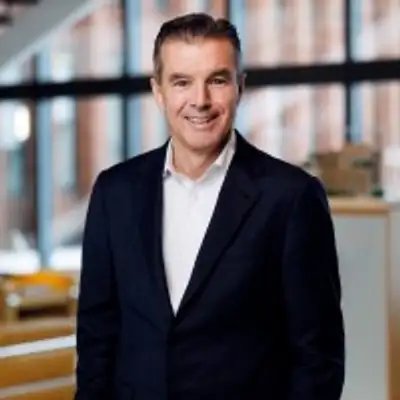Keep an eye out for future episodes featuring insight and expertise from leaders in the cement industry and remember to support the World Cement Podcast by subscribing, rating, and reviewing!
Creators and Guests
What is World Cement Podcast?
The World Cement podcast: a podcast series for professionals in the cement industry.
Hello everyone and welcome to episode three of the World Cement podcast. In this episode we're taking a trip to Athens, Greece, the birthplace of democracy, western philosophy, literature, art and architecture. And perhaps most notably the host city for EnviroTech twenty twenty five. At EnviroTech, my colleague Alfie Lloyd Perks was able to catch up with Christopher Ashworth, president of FLSmidth Cement Over the course of their discussion, they covered the journey to decarbonisation, the importance of partnerships and collaboration, the role of digitalisation, and more. So, without further ado, I'll hand you over to Alfie and Christopher. I just wanted to take a moment to remind you to register for WorldCement. It's free of charge and gives you access to the latest issues of WorldCement, both in print and online.
David Bizley:Every issue comes packed full of regional analysis, technical articles, project case studies, and the latest industry news. Simply head over to worldcement.com, click the magazine tab, and register today. It's as simple as that. Happy reading.
Alfie Lloyd-Perks:Christopher, to begin with, FLSmidth has made very ambitious commitments towards sustainability, including mission zero. How close is the cement industry to achieving full decarbonization, and what are the biggest hurdles?
Christopher Ashworth:Yeah, thanks Alfie. I mean reducing carbon emissions is the greatest challenge of our time and I think everybody's aware of this and many not just FLSmidth Cement are focusing on the very ambitious commitments on delivering decarbonization. And then if you look back over the last thirty years, we would cut per ton emissions by around 25% and and I think there's certainly a pride to that but we're we are way away from full decarbonization.
Christopher Ashworth:And so when you look at us, you look at our customers, I mean everybody's roadmaps are kind of focused on 02/1950 and then you say, okay we're in 2025, we have twenty five years left, seems like we have plenty of time but we're this is an industry where the, you know the lifetime of the assets can last decades and so the investments and the decisions and in that journey to get to full decarbonization it needs to start now. So by saying that the good news is that there's a lot of a lot of cement companies making these investments and it can be anything from from the automation level to energy savings from the technologies for example that we we certainly offer to the market, fuel substitution, to clinker substitution, so there's a lot of activity happening which is good news. I mean right now we're getting a lot of pull on our technologies and certainly on our services be it our global service team that's going on-site and helping our customers solve their problems but also our digital. So our ability to connect and be that trusted advisor with our customers and help them to operate more effectively.
Alfie Lloyd-Perks:Yeah and yeah there's certainly an appetite isn't there from the whole industry and Air Force Mares of course for that sustainability, for that drive towards sustainability. Very much. And on a sort of related note, what role do partnerships, whether with governments and competitors or tech firms, what role do those partnerships play in accelerating sustainable cement production?
Christopher Ashworth:Well I think one thing that one size doesn't fit all, right? Every plant is different in terms of the pathway to get to sustainable cement production. There's a host of factors, business factors, economic factors, the local market conditions, customer demand, the availability of alternative fuels or supplementary cementitious materials and in any case the focus and the drive to really look at partnerships with the governments, competitive tech So based on that there is no single this is the way, this is the answer. And I think for F. L.
Christopher Ashworth:Schmidt Cement we've understood this from the start and we have driven innovation as a company but also innovation through partnerships. And this could be partnerships that we have with academia, with government organizations, certainly with customers and some of our R and D initiatives, other hard to abate sectors. And we've got projects ongoing now in the background for electrification, carbonating recycled concrete, increasing the use of SEMs through digitization, so there's a host of things that is really a conglomerate of partnerships where we're leading.
Alfie Lloyd-Perks:Yeah, And noticed you say digitalization and how is FLSmidth leveraging digitalization to make cement production more efficient and sustainable?
Christopher Ashworth:Yeah, so we're living in an even more rapid environment when we discuss the digital space, characterized by machine learning, the industrial Internet of Things, big data and of course the cement industry is not immune to this according to world cement by the way. Plants today utilizing smart sensors, IIoT devices, really leveraging real time data analytics are seeing the benefit from a digital standpoint but also from a sustainability standpoint, right? A 20% increase in production efficiency, 15% reduction in your energy consumption and a 10% decrease in your raw material waste. And then from a technology standpoint what can we do for our customers with the speed of change in this space? And one source of pride for us is the fact that we've been in the automation space since the 1960s and that has been focused on the cement industry so we go quite deep with our knowledge and the expertise that we have within our people in into our software suite.
Christopher Ashworth:Last year we launched our latest updates to our ECS plant automation solution so this was Control Center, this is Process Expert, plant data management and really geared these solutions firmly into the industry four point zero space. For example in ECS and PXP, our process expert, we include our data books module right this is allowing for reliable integration with open source AI and data science tools. Again the speed for our customers and really in almost in real time being able to say how are we doing it on-site. Additionally on digitization we have our OCMS or Online Condition Monitoring System. Our services are that we connect directly into the plant and either 20 fourseven are constant monitoring for our customer base or as and when from the control room where we can actually join them digitally in the control room and help them solve any issues that they may see.
Christopher Ashworth:Be that trusted advisor that we've been for the last you know over a century.
Alfie Lloyd-Perks:Absolutely yeah. And do you see digitalization and sustainability as two separate goals or do you actually find that they complement each other?
Christopher Ashworth:They're definitely complementary. We kind of look at digitization as a tool, as an enabler rather than the goal itself. I mean I mentioned before just the plant utilization, the decrease in energy consumption, the savings in terms of raw materials that are enabled by digitization. Of course this is going directly to delivering more sustainable cement.
Alfie Lloyd-Perks:And now looking forward what excites you most about the future of cement production?
Christopher Ashworth:That's a great question. So I guess let's start and say, while we're focused on cement, think one thing we have to realize is that it's not the final product, right? It's an ingredient going into concrete. That recipe for the last two hundred years has been aggregate Portland cement and water and maybe some limited SCM options like fly ash or slag. But then as we're looking forward in the next few decades, we're transform as the blends change to reduce the Portland content, the non clinker binding systems are developed further, emerging SCMs coming to the market and all driven by pressure from the construction companies to cut their carbon footprint.
Christopher Ashworth:And that pressure may be at a faster rate than we're seeing in the cement industry today and you know the question is are we ready for it now? It's going to require agility, it's going to require commitment from the cement producers and companies like us that that are supplying. We need to listen, need to work with the ultimate end users, it's gonna be rapid innovation, it's gonna be disruption, it's gonna be transformational, but you know at the same time it's an exciting place to be. And if I take a step back and if I look at FLSmidth. We've been on a journey, a transformation journey over the past couple of years. Most recently is as you probably heard we've separated ourselves as an independent entity through our what we call pure play a transition right and this this really separates us from our parent companies a mining business but it's really benefited us as a company in terms of being able to laser focus on developing the equipment services and solutions that are needed by the cement industry today and really focus on the investments that we require for our future and our customers' future.
Alfie Lloyd-Perks:Yeah and just to sort of finish off this podcast, what advice would you give to cement producers looking to future proof their operations you know against both environmental and economic challenges? Well, first come talk to us.
Christopher Ashworth:I mean that would be my first answer and let's discuss it in the opportunity to reconsider how things can be done. Mean continuity is a really safe place to be and with some of the coming changes that we see that we're experiencing already today but as we look forward if we're not changing then obviously we have the risk of being left behind. I'm not saying you have to be a pioneer I'm just saying that today there are already proven technologies and solutions that exist that can provide the journey to take you on this green journey. And yes in all seriousness please do come talk to us. We have fantastic organization that I'm lucky enough to lead and this is a team that's going to provide the guidance and support needed to help you identify and take the next step.
Alfie Lloyd-Perks:Perfect. Well Christopher thank you very much for that. It's been an absolute pleasure.
David Bizley:Okay. Thank you everyone for joining us for another episode of the World Cement Podcast. Make sure to keep your eyes peeled for more information on the next episode coming soon. And if you'd like to support the podcast and see it grow, we'd really appreciate your help by subscribing, rating, and reviewing us. Thank you.
David Bizley:I just wanted to take a moment to remind you to register for World Cement. It's free of charge and gives you access to the latest issues of WorldCement, both in print and online. Every issue comes packed full of regional analysis, technical articles, project case studies, and the latest industry news. Simply head over to worldcementcom, click the Magazine tab, and register today. It's as simple as that.
David Bizley:Happy reading!

